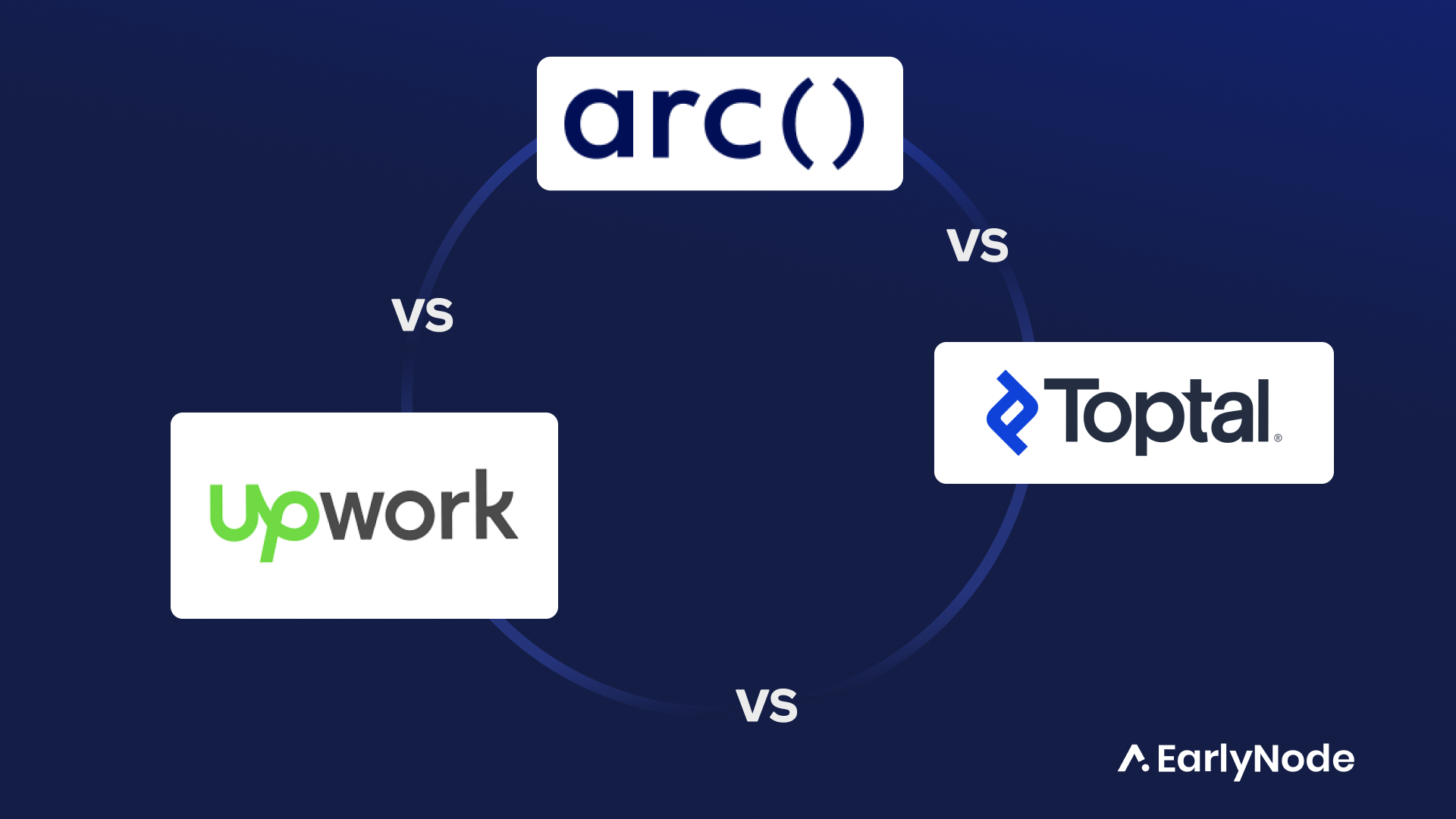How To Hire A Software Developer

Last year and this year, the tech world struggled with an $8.5 billion ‘tech crunch problem.’ There were millions of vacant roles in the tech startup industry.
The reason? Fierce market competition, inexperienced startup founders struggling with recruitment, and outdated hiring models.
For startups looking to hire software developers, making the wrong hiring choice is an expensive mistake. This guide will give you the scoop on finding top talent.
Steps to hiring a software developer
Hiring a good developer is both an art and a science. Let’s make it less intimidating and more actionable in 8 steps:
Step 1: Define your job requirements
Before you know who to hire, you need to know what you want them to do. Jot down the exact requirements of your project. Are you building a mobile app, a web service, or an AI solution?
Different projects require developers with expertise in various languages and platforms. A clear vision of your project will act as a compass to know who to hire.
Step 2: Define your developer expectations
Decide what you expect of the developer you want for the job. Clarity is key when you’re bringing someone new on board. Before signing on that dotted line, talk about the expectations.
If you’re imagining they’re available 24/7 while they’re thinking of cozy weekends off, you’re setting up for an unnecessary clash.
Also, think about your team dynamics. Do you need a rockstar who likes to work from home, or do you prefer to work up close in person with your team? Maybe you want someone who’s not only good technically but also has a knack for UX or understanding customer needs.
So, before you bring that developer into the team, set the stage for smooth sailing. Spell out what’s acceptable and what might be a stretch—and ask them to do the same.
And don’t forget the soft skills: adaptability, problem-solving, and the hunger to learn.
Step 3: Set a reasonable hiring budget
This isn’t just about salary. Count the costs of benefits, perks, resources, and training and set a reasonable budget to cater to all of these.
That’s not all; consider the potential cost of NOT hiring a good fit (the time wasted, the training invested, etc.). A good developer might cost more upfront but save money in the long run by avoiding costly mistakes.
We’ll dive deeper into the cost of hiring a developer later in this article.
Step 4: Write an attractive job description
Your job description isn’t just a list of duties; it’s your sales pitch. Mention the cool tech stack, the growth opportunities, any unique benefits or perks, and the impact the role will have on the company and its mission. Developers want to work where they feel their input matters.
One idea is to look at what competitors in your space are doing. What benefits and perks are they offering, etc.? Can you offer something similar without breaking your compensation structure? If yes, go for it. If not, offer incentives to make your job ad more attractive than your competitors in order to attract the best candidates.
Step 5: Define and optimize your hiring funnel
You need to optimize your hiring process from start to finish. Start with how they’ll find your ad (step 6), the application process, stages of interviews, feedback loops, and the final offer.
The faster the time from application to offer, the better impression you make on the candidate and the harder it is for them to refuse when your offer comes while he’s still interviewing with other companies. This can be a huge advantage in a competitive job market.
With so many companies competing for top talent, it’s easy for candidates to be in the middle of a bunch of interviews all at once. If your hiring process is too lengthy and complicated, you could miss out on some prime candidates.
We get it. Thorough interviews are supercritical. But it’s worth taking a step back and thinking, “Do we really need all these steps?” Unnecessary interviews where you don’t really learn anything new about the candidate aren’t just potential deal-breakers for candidates; they also eat into your team’s time, which hits the wallet.
The bottom line? Shorter, sharper hiring processes can often get you the results you want without the extra fluff or costs. Here’s an example of how we hire developers for ReactSquad, our software agency:
Round 1 👉 15-minute screening interview
Round 2 👉 Coding challenge
Round 3 👉 Culture interview
Round 4 👉 CTO interview
Round 5 👉 Make an offer
💡 We’ve gotten to the point where we can execute this whole process within 3 business days.
We’ll go into detail with our process in step 7.
Step 6: Search in the right places
Yes, there’s LinkedIn, but don’t forget niche sites like Stack Overflow Jobs, GitHub, or even tech meetups in your local area. Engaging with local developer communities or sponsoring hackathons can also get your name out in the tech ecosystem.
Ultimately, it depends on the kind of developer you are hiring. If hiring an in-house software developer, job boards like Indeed, developer forums, and networking events are your best bets.
For freelance or remote developers, consider hiring from platforms like Turing and Toptal. You can also think about hiring from developer agencies. These agencies have experts skilled in specific technologies.
Chances are they have developed products similar to yours, so they understand your needs, making it easier to work with them.
Step 7: Screening and interviews
Make a shortlist of the best-matching candidates and book them for an interview. Interviews give you an opportunity to know more about the candidates to find the best fit. At EarlyNode, there are 4 interviews we conduct.
- Communication skills Interview: Developers aren’t isolated; they interact with teams, managers, and sometimes clients. We conduct a 15-minute interview to screen for communication skills and other red flags. We check to see if they can explain their thoughts clearly, understand feedback, and collaborate effectively. A hiring manager or HR specialist can conduct this interview.
- Coding Challenge: We don’t just grill them on theory. We have them solve real-world problems they might face on the job. Live tests or mini-projects reveal their hands-on skills better than any quiz. This helps us identify those who are top-notch on the technical side so that we can get to know them more in the next interview stage. You can have your CTO or a seasoned developer do this interview.
- Culture fit Interview: The founder usually conducts this interview. It helps us to know more about the candidate on a human level. We check to see if they gel well with our company’s values, goals, and the existing team. This interview is crucial because even a tech genius can cause issues if they don’t vibe with the team or the company culture.
- CTO Interview: Mix technical interview and culture interview to go deeper into the technical knowledge but also see if the candidate fits the engineering org.
💡 Pro Tip: Try to keep the interview gaps short. It helps the candidates know that you’re still interested, and it helps you to assess the prospects while the qualities of each candidate are still fresh in mind. Our process from application to offer takes only ONE week.
Step 8: Make a competitive offer for your preferred candidate
You’ve found “the one.” Now, don’t lose them to a better offer. Make your package competitive not just in salary but in other benefits that promote human values. For example;
For opportunities for growth, put in a learning stipend.
For networking opportunities, offer to pay for 1-2 developer conferences a year.
For work-life balance, offer a 4-day workweek.
Throw in any other valuable perks. The best candidates know their value and appreciate it when you recognize that value.
3 benefits of hiring a great software developer
When figuring out what sets great software developers apart, here are some standout traits:
1. Quality Results: The best developers don’t just deliver; they exceed expectations, ensuring you get bang for your buck.
2. Current Expertise: They remain up-to-date with the latest technologies, databases, and frameworks.
3. Teamwork and Soft Skills: Top developers aren’t just tech-savvy; they’re team players with strong interpersonal skills, which is gold in the tech world.
Things to consider to avoid hiring a bad software developer
Hiring the wrong software developer could lead to project delays, cost overruns, and overall dissatisfaction among the team. Let’s show you a few pointers to avoid those mistakes:
Culture fit
Ever tried wearing shoes that aren’t your size? That’s what a mismatched culture fit feels like. It’s all about how well a candidate vibes with your company’s values, work style, and overall atmosphere.
Before you even start the hiring process, be clear about what your company stands for. What are your core values? What is the work environment like?
Once you’re clear, maybe consider a “test drive” hiring — like a probation period. This allows both the company and the developer to evaluate if the culture fit is right.
Good communication skills
Developers need to wear two hats. One, they’ve got to break down geek-speak for folks who don’t speak code, aka non-technical stakeholders. Two, they’ve got to talk about needs, give updates, and iterate based on feedback. This not only tests their communication skills but also their flexibility.
Top-tier software projects thrive on good communication. Great developers nail their tasks and help their team members, especially in frameworks like Agile. Good communication keeps everyone aligned, whether in-house or working remotely, and keeps efforts from being misdirected.
Good Problem-solving Ability
The best developers aren’t just code monkeys. When things go sideways, a good developer can think critically, analyze issues, and find solutions.
Talented and experienced
Debating between a talented developer and a seasoned pro? Why not both? You want someone who’s got the instinctive flair and the battle scars from the trenches. It’s like choosing between a race car and a reliable sedan — imagine having a fusion of both. A blend of raw skill and practical experience ensures they can handle the tasks you’ll throw at them.
Trust your instinct
You know the saying, “Trust your gut”? Turns out, it’s got some science backing it up. Of course, that doesn’t mean we shouldn’t double-check our biases. If something’s telling you a software developer might not be the right fit—and it’s not some knee-jerk stereotype—it’s worth giving that gut feeling the spotlight. After all, it’s better to be safe than sorry.
Clarity is key when you’re bringing someone new on board. Before signing on that dotted line, talk about the expectations. If you’re imagining they’re available 24/7, while they’re thinking of cozy weekends off, you’re setting up for an unnecessary clash.
So, before you bring that developer into the team, set the stage for smooth sailing. Spell out what’s acceptable and what might be a stretch—and ask them to do the same.
Stress the importance of sticking to deadlines
Picture this: A pesky bug is wreaking havoc on your client’s product performance, and end users aren’t happy. Your client reaches out to their developer, who promises to squash that bug. But oops! They forget.
You’ve got frustrated users breathing down your neck, and it’s a PR nightmare. That’s why when you’re hiring, you need someone who’s not just skilled but also agile and deadline-driven.
Sure, you can’t see if a developer will meet deadlines until you start working with them. But you can have a hint during interviews. Ask how they’d cope if they found themselves trailing behind. Would they hit the panic button or have a game plan? And, importantly, how would they inform their team?
Everyone hits a wall now and then. But in the coding world, it’s all about the bounce-back.
Cost of hiring a software developer
The cost of hiring a developer depends on many factors, such as
- Developer’s level of experience
- Hiring full-time vs contract
- The popularity of tech framework: Less popular frameworks would have few developers skilled in them, meaning it will cost you more to find one skilled in that tech.
- Project duration: Longer-term projects will cost more than short-term ones, but it can be cheaper if you maintain the same team for a long time.
- Location: US-based developers are the most expensive, while developers in countries like India and Ukraine may be affordable, but finding high-quality developers is rare.
On average, expect to pay anywhere between $40,000 – $180,000 per year, depending on location, for full-time in-house developers (all levels) for projects that will last several months. For freelance or contract developers, expect to pay between $35 and $140 per hour depending on location and quality.
If you want detailed insight into the cost of hiring a developer, especially for React projects, you can learn more here.
Best place to hire expert React developers
Looking to beef up your team with top-notch remote React developers? Consider ReactSquad. Here’s why:
We are a boutique React.js agency for SaaS startups. Our expert developers are spread across the European and USA time zones. This means we’re always in sync with your schedule!
You can hit the ground running with a ReactSquad developer embedded in your team, shipping code in less than 7 days. No fine print, no surprise fees.
Visit our website here to get started today.




